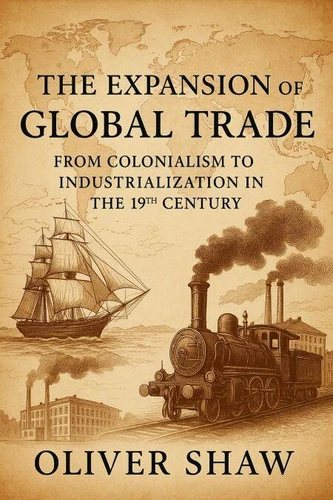The Expansion of Global Trade: From Colonialism to Industrialization in the 19th Century
Par :Formats :
Disponible dans votre compte client Decitre ou Furet du Nord dès validation de votre commande. Le format ePub est :
- Compatible avec une lecture sur My Vivlio (smartphone, tablette, ordinateur)
- Compatible avec une lecture sur liseuses Vivlio
- Pour les liseuses autres que Vivlio, vous devez utiliser le logiciel Adobe Digital Edition. Non compatible avec la lecture sur les liseuses Kindle, Remarkable et Sony
 , qui est-ce ?
, qui est-ce ?Notre partenaire de plateforme de lecture numérique où vous retrouverez l'ensemble de vos ebooks gratuitement
Pour en savoir plus sur nos ebooks, consultez notre aide en ligne ici
- FormatePub
- ISBN8227283207
- EAN9798227283207
- Date de parution18/04/2025
- Protection num.pas de protection
- Infos supplémentairesepub
- ÉditeurBig Dog Books, LLC
Résumé
The Expansion of Global Trade: From Colonialism to Industrialization in the 19th Century by Oliver Shaw explores the complex transformation of global trade during the 19th century, a period that saw the intertwining of colonial expansion and industrial growth. The book delves into how European colonial powers, seeking raw materials and markets for their burgeoning industrial economies, expanded their empires across Africa, Asia, and the Americas.
As steam engines and mechanization revolutionized industries, new transportation and communication networks enabled the rapid exchange of goods on an unprecedented scale. Shaw examines the political, economic, and social impacts of these developments, including the exploitation of colonial labor, the rise of multinational corporations, and the economic rise of Europe and North America. With a focus on key historical events, ideologies, and technological advancements, this book offers an in-depth look at how global trade shaped the modern world economy and set the stage for the 20th century's conflicts and opportunities.
As steam engines and mechanization revolutionized industries, new transportation and communication networks enabled the rapid exchange of goods on an unprecedented scale. Shaw examines the political, economic, and social impacts of these developments, including the exploitation of colonial labor, the rise of multinational corporations, and the economic rise of Europe and North America. With a focus on key historical events, ideologies, and technological advancements, this book offers an in-depth look at how global trade shaped the modern world economy and set the stage for the 20th century's conflicts and opportunities.
The Expansion of Global Trade: From Colonialism to Industrialization in the 19th Century by Oliver Shaw explores the complex transformation of global trade during the 19th century, a period that saw the intertwining of colonial expansion and industrial growth. The book delves into how European colonial powers, seeking raw materials and markets for their burgeoning industrial economies, expanded their empires across Africa, Asia, and the Americas.
As steam engines and mechanization revolutionized industries, new transportation and communication networks enabled the rapid exchange of goods on an unprecedented scale. Shaw examines the political, economic, and social impacts of these developments, including the exploitation of colonial labor, the rise of multinational corporations, and the economic rise of Europe and North America. With a focus on key historical events, ideologies, and technological advancements, this book offers an in-depth look at how global trade shaped the modern world economy and set the stage for the 20th century's conflicts and opportunities.
As steam engines and mechanization revolutionized industries, new transportation and communication networks enabled the rapid exchange of goods on an unprecedented scale. Shaw examines the political, economic, and social impacts of these developments, including the exploitation of colonial labor, the rise of multinational corporations, and the economic rise of Europe and North America. With a focus on key historical events, ideologies, and technological advancements, this book offers an in-depth look at how global trade shaped the modern world economy and set the stage for the 20th century's conflicts and opportunities.























